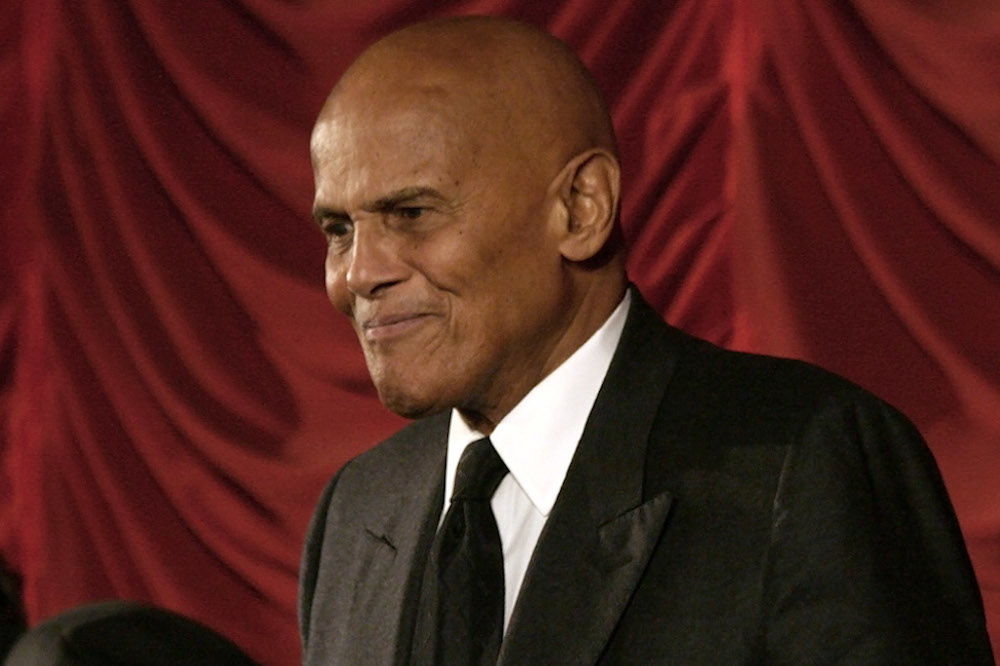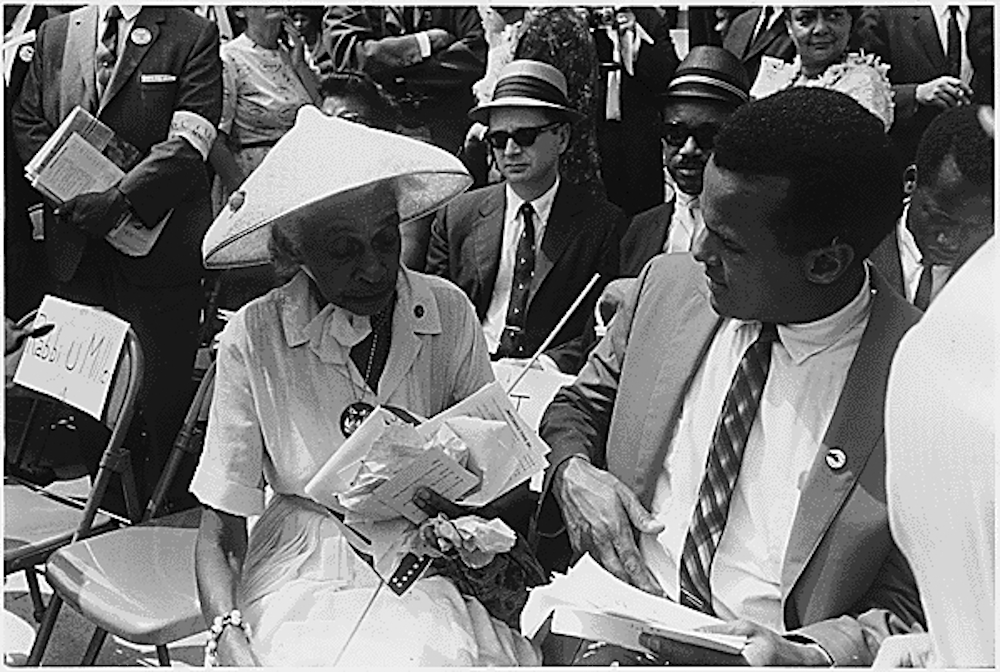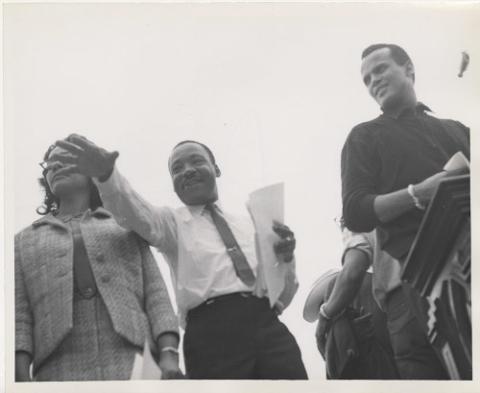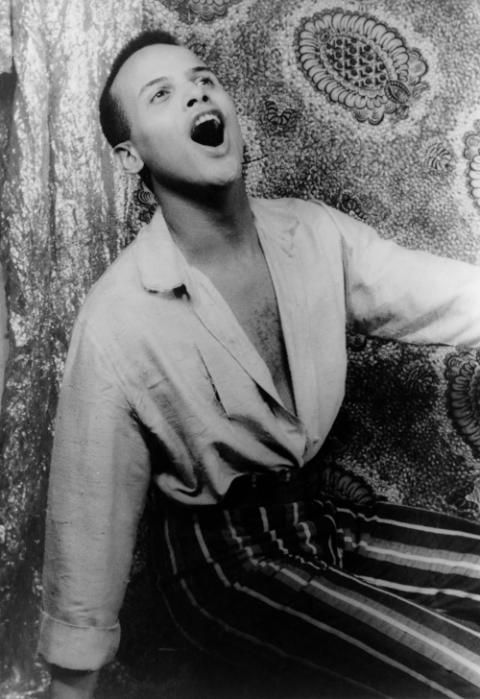
Harry Belafonte at the Vienna International Film Festival in 2011. (Wikimedia Commons/Manfred Werner-Tsui)
Harry Belafonte, the famed Black entertainer and activist whose voice adorns several of the mid-20th century's most famous recordings, died of heart failure on April 25 in New York. He turned 96 in March.
"Whether he was breaking barriers as a young musician, supporting civil rights activists in the 1960s, or convening (and calling-in) the next generation of leaders and artists, Mr. B was unfettered in his commitment to improving the lives of oppressed people across the globe," his daughter Gina said in a statement via the Sankofa Justice & Equity Fund, Belafonte's legacy foundation.
"While today I know his fans, friends and family are saddened by his passing, our family will be forever grateful for his legacy and leadership. He's left a shining example of what love, community and commitment looks like."
Best known as the popularizer of the calypso genre of music, the Harlem native was born Harold George Bellanfanti, Jr. to mixed-race Jamaican parents in 1927, amid the Harlem Renaissance and its flourish of Black arts heavyweights. Belafonte's own career would begin some two decades later, with a breakthrough in the theatre scene that led to a Tony Award in 1954.
A noted singer, he released his first notable single, "Matilda," in 1953, before his "Calypso" album three years later — the first in the world to sell a million copies within a year. It would spend 99 weeks on the Billboard charts and bring the music of his parents' home region to the American public.
Perhaps his most famous track, "Day-O (The Banana Boat Song)," was a cover of a Trinidadian folk song that anchored the album and became his signature song. It remained part of his repertoire throughout his career.
Advertisement
Belafonte would go on to record across a number of genres, including blues, jazz, Broadway, and gospel, releasing more than 40 albums in total. Though none of his later albums reached the broad commercial success or impact of his first, the 1961 release "Jump Up Calypso" also went platinum.
"I was tilting more toward pop than jazz," he wrote in his 2011 memoir.
"My new managers had noted I drew a lot more women than men, and had me crooning love songs that tugged at their heartstrings. … Afterward, I stayed up drinking with the musicians, wondering how a one time gig at the Roost, meant only as a stopgap until I found work as an actor, had turned into a full-time job."
Belafonte would indeed eventually make his way to Hollywood, sustaining a 65-year career in film in which he garnered a number of leading roles —at least one of which he declined due to the film's racist overtones. For seven years during the height of his career, Belafonte also refused to perform in the South due to the prevailing Jim Crow attitudes and policies in white society.
Activism remained a focus for Belafonte throughout his life, and he is credited as a major financier of the Civil Rights Movement, which sought an overturning of the post-Reconstruction disenfranchisement and terrorism against Blacks that lasted for the better part of a century. Belafonte bankrolled much of Dr. Martin Luther King Jr.'s activities and personally raised more than $50,000 to bail the famed preacher out of the Birmingham City jail alongside other protesters.
Among various other efforts during the movement, Belafonte also financially supported the Student Nonviolent Coordinating Committee (SNCC), the 1961 Freedom Rides to New Orleans, and the 1963 March on Washington — where he stood alongside King as he deliver his famed "I Have a Dream Speech" on the National Mall. They would remain close friends until King's death.
Belafonte's social activities also extended into humanitarian causes, including the anti-Apartheid Movement in South Africa and the music supergroup USA for Africa, which benefited victims of famine and disease in the motherland. For the latter ensemble, Belafonte organized the Grammy Award-winning song "We Are the World" in 1985, which went on to become one of the top 10 best-selling physical records in history. On the homefront, the former bluejacket and World War II veteran positioned himself firmly within a left-leaning milieu, criticizing U.S. foreign policy in Cuba, the Soviet Union, Grenada and Spain.
Belafonte's activist work also brought him into contact with the faith of his childhood, having been reared a Catholic by his devout mother, attending St. Thomas the Apostle Catholic Church and St. Charles Borromeo School in Harlem. He would credit his mother as a primary inspiration for his activism, with her words during his youth: "Don't ever let injustice go by unchallenged."
Belafonte later left the church, but maintained tenuous connections partly due to his first wife Marguerite, who converted during their relationship. (This later factored into their divorce.) Belafonte also noted in his memoir that many of his collaborators in the 20th century progressive movement were nuns.
"I still had such conflicted feelings about the church, such anger at those Catholic nuns who'd rapped my knuckles long ago," he wrote.
"But these ladies, these activist nuns, were a very different breed, and I felt blessed — there was no other word for it — at being in their company."

Actor Harry Belafonte, right, at a 1963 Civil Rights march in Washington, D.C. (Wikimedia Commons/U.S. Information Agency/Press and Publications Service)
One such nun, Sr. Thea Bowman, a Franciscan Sister of Perpetual Adoration, became a face of Black Catholic activism during the same period, making headlines for her bold display of culture and resistance in a church often associated with European austerity. Belafonte became fascinated with her story, and at one point in the late 1980s planned to cast Whoopi Goldberg to play her in a biopic.
He also organized the famed "Stars for Freedom" rally that drew 25,000 participants in 1965, featuring celebrities performing to raise morale for a voting rights march in Alabama. The venue? The City of St. Jude, a Catholic complex in Montgomery serving the city's Black population. Decades later, Belafonte would find a collaborator in Cardinal Roger Mahoney of Los Angeles, with whom he created the Urban Peace Awards in 2002, celebrating the achievements of activists and public figures working for the common good.
Over his nearly 75-year career in entertainment, Belafonte became one of the few artists to achieve "EGOT" status, having won three Grammys, an Emmy (for "Tonight with Belafonte" in 1960), a Tony, and the Jean Hersholt Humanitarian Award from the Academy of Motion Picture Arts and Sciences.
In 2013, Belafonte received the Spingarn Medal from the NAACP, later using his appearance at the Image Awards ceremony to advocate for gun control.
"A river of blood that washes the streets of our nation flows mostly from the bodies of our Black children," he said.
"Yet, as the great debate emerges on the question of the gun, white America discusses the constitutional issue of ownership, while no one speaks of the consequences of our racial carnage. The question is: Where is the raised voice of Black America? Why are we mute? Where are our leaders, our legislators? Where is the church?"

Martin Luther King, Jr. and Harry Belafonte near the podium at the Montgomery March in 1965. (Wikimedia Commons/Center for Jewish History, NYC)
Quoting his mentor, the Black entertainer-activist Paul Robeson, Belafonte added: "Artists are the gatekeepers of truth. We are civilization's radical voice."
Named in his honor, the inaugural Harry Belafonte Voices For Social Justice Award was awarded by the Tribeca Film Festival in 2021, the same year Belafonte was named a Chevalier of the Legion of Honor in France — occasioning one of the star's last public appearances. In 2022, Belafonte was inducted into the Rock and Roll Hall of Fame in absentia.
Belafonte leaves behind four children and two stepchildren, the product of his three marriages. His wife Pamela Frank, whom he married in 2008, was at his side at the time of his death.
Funeral arrangements for Belafonte have not been publicly announced.
Editor's note: This story was originally published at Black Catholic Messenger. It has been republished with permission.








